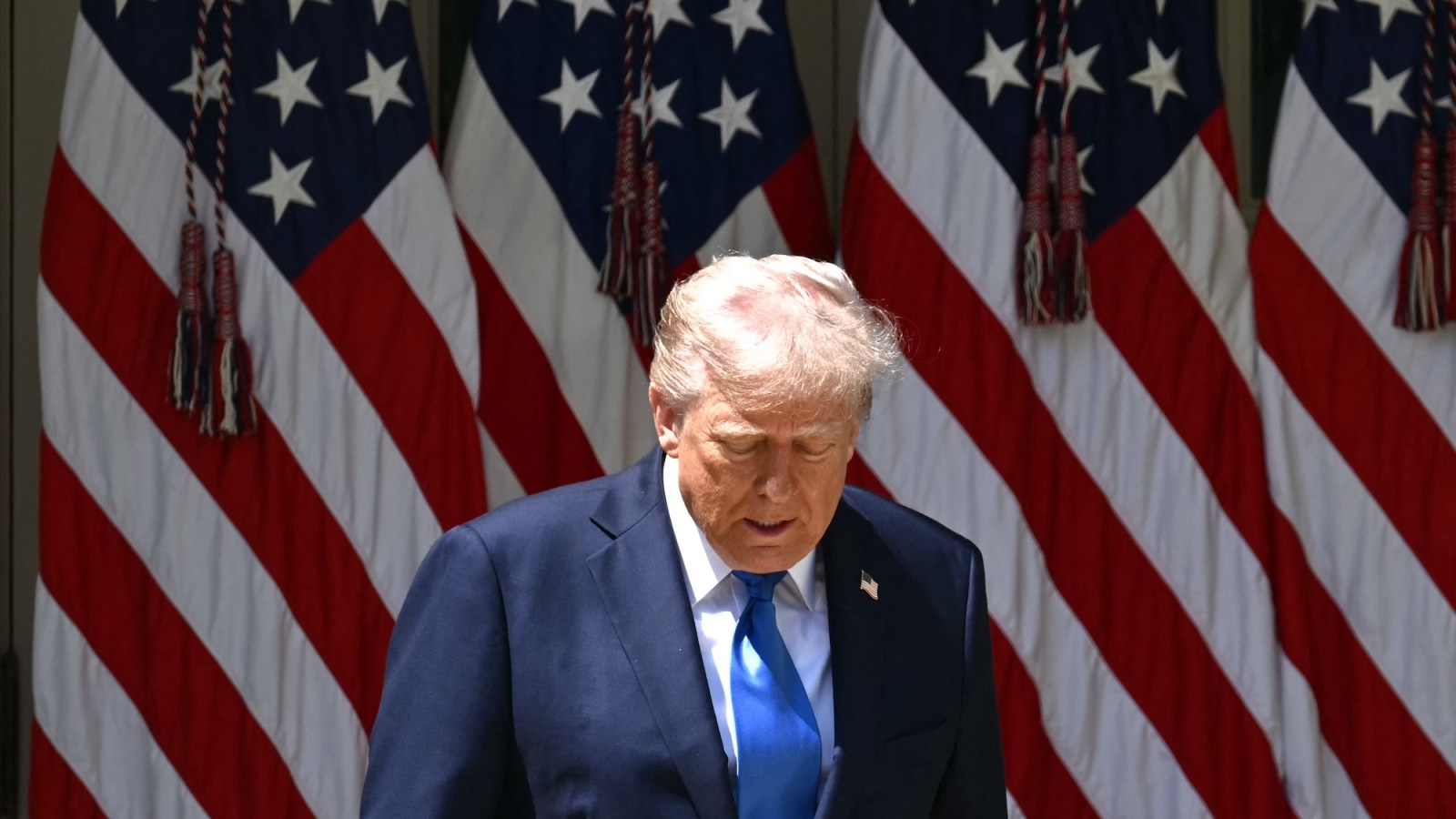
Donald Trump tried to argue that prices on gas and groceries are falling even though the numbers disprove those claims. He also encouraged Americans to buy fewer dolls and pencils as a way to deal with rising costs due to his tariff policies.
“Prices are down on groceries. Prices are down for oil. Prices are down for all energy. Prices are down at tremendous numbers for gasoline,” the president told moderator Kristen Welker during an interview that aired Sunday on Meet the Press.
Trump then said that gas prices are “down to $1.98 in many states right now,” repeating a claim he made weeks ago and again at least three times in the past week, CNN found. But according to AAA, gas prices have increased since Trump was inaugurated in January.
As of Sunday, the current average price for a gallon of regular gas is $3.17, and no state has an average gas price of $1.98. In fact, GasBuddy, a company that tracks gas prices at more than 150,000 gas stations nationwide, could find no gas station in the country selling gas at that price during the month of April, the company told CBS News. The lowest price they could locate last month was $2.19 per gallon at a Texas gas station.
As for grocery prices, Trump claimed they are down when the Consumer Price Index shows the average cost of groceries rose 0.4 percent in March and 0.2 percent in February, the latest data available. While the White House has said that Trump is talking about prices of some goods, like fresh vegetables, that have recently decreased in price, the prices of other goods like eggs, meats, poultry, and fish all rose in March.
Prices are also likely to rise on all sorts of imported goods when Trump’s broad tariffs go into effect, which has the president becoming an unlikely opponent of mass consumption as he struggles to defend the fallout of punishing tariffs. Trump last month announced a 90 day delay on tariffs except for tariffs on China, which are already in effect. He also claimed last week to have already finalized some 200 trade deals, but he has not released any details on which countries those deals are with. The number of alleged deals also exceeds the number of countries on earth recognized by the United Nations (193).
Welker pointed out that because of the tariffs, “You said some dolls are going to cost more. Isn’t that an acknowledgment that some prices will go up?”
“I don’t think that a beautiful baby girl needs — that’s 11 years old — needs to have 30 dolls,” said Trump, whose children were raised in a gilded penthouse. “I think they can have three dolls or four dolls because what we were doing with China was just unbelievable. We had a trade deficit of hundreds of billions of dollars with China.”
A trade deficit simply means that the U.S. imports more goods from China than it exports to China, which makes sense given the Asian nation’s status as a manufacturing hub for many of the things we use every day — from toys and clothing to smartphones and other electronics. American labor is more costly, and American factories do not have the capacity to fill the gap. Still, Trump has slapped China with astronomical 145 percent tariffs, causing trade between them and the U.S. to effectively cease.
“When you say, ‘They could have three dolls instead of 30 dolls,’ are you saying… that Americans could see empty store shelves?” Welker asked.
“No. No, I’m not saying that,” Trump replied. “I’m just saying they don’t need to have 30 dolls. They can have three. They don’t need to have 250 pencils. They can have five.”
He added, “We don’t have to waste money on a trade deficit with China for things we don’t need, for junk that we don’t need.”
Trump did, however, admit that keeping tariffs on China at current levels is untenable.
“At some point, I’m going to lower them because otherwise, you could never do business with them,” he said. “And they want to do business very much. Look, their economy is really doing badly. Their economy is collapsing.”
Even if Americans cut back on purchasing dolls and pencils, a bevy of other goods will see rising prices thanks to Trump’s tariffs on China, including: iPhones, cars, clothing, shoes, wine and spirits, furniture, coffee, and chocolate. Product shortages are also likely, experts say. Already, import shipments to U.S. ports have declined.
When Welker asked Trump about U.S. trade with Canada, Trump said, “We don’t need their cars, we don’t need their lumber, we don’t need their energy. We don’t need anything. We do very little business with Canada. They do all of their business practically with us. They need us. We don’t need them.”
But Canada is America’s second largest trade partner and the top buyer of American exports, as Capitol hill correspondent Jamie Dupree pointed out. Trump additionally refused to back down on his idea to make Canada a U.S. state.
One area where Trump is correct is that prices of oil are actually falling. But that is not a positive sign.
“It’s a measure of the expected use of energy in our economy,” Tucker Balch, an Emory University finance professor told ABC News. “It is because of Trump’s policies but it’s not an endorsement of his policies.”
The economic outlook under Trump is, in fact, quite bleak, with a potential slowdown or recession on the horizon for the U.S. and likely the global economy as well. But Trump in the interview only took credit for the “good parts” of the economy and blamed former president Joe Biden for the “bad parts.”
“When does it become the Trump economy?” Welker asked.
“It partially is right now,” Trump said. “I think the good parts are the Trump economy and the bad parts are the Biden economy.”